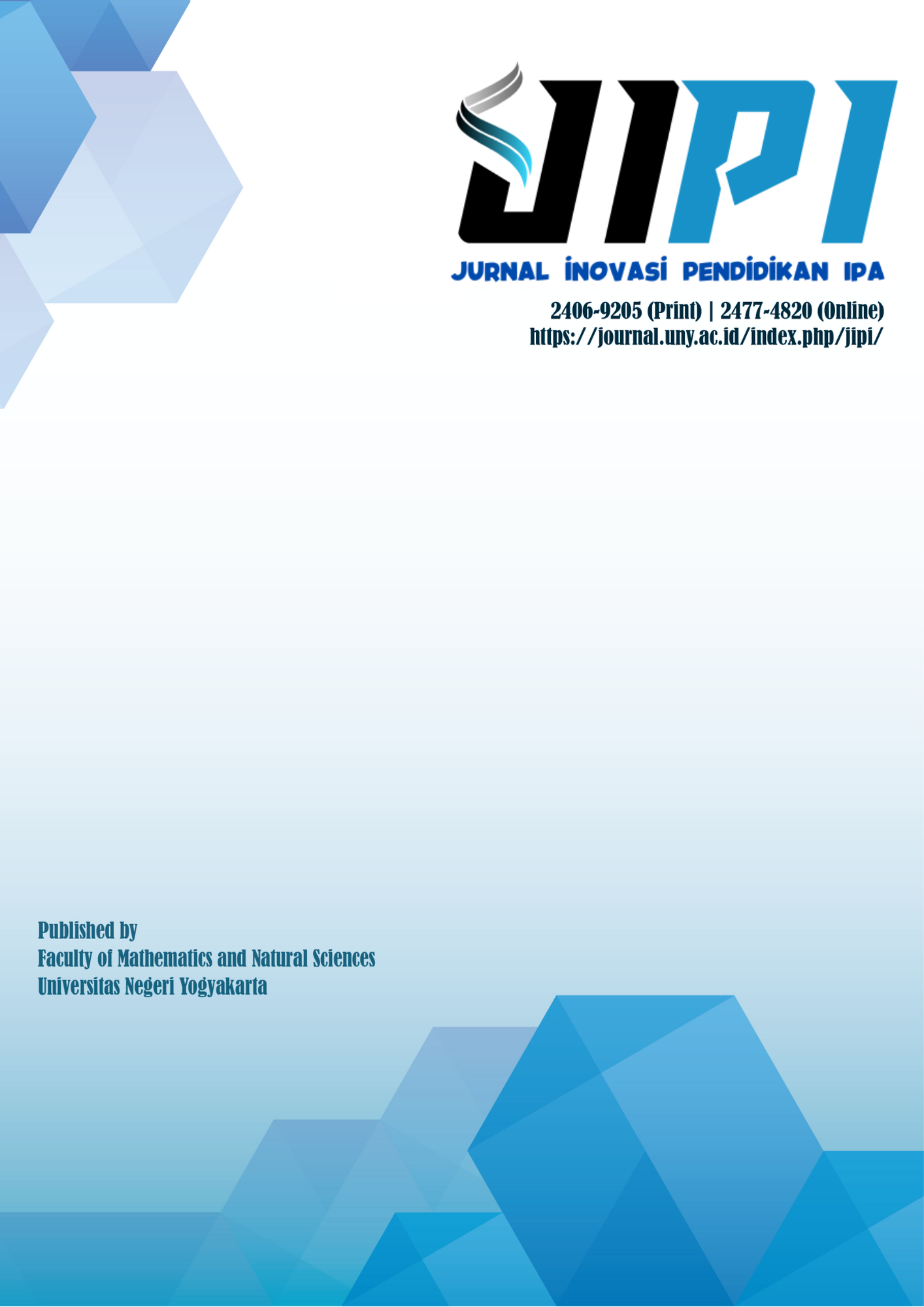Validity of evaluation instrument on the implementation of performance assessment to measure science process skills
DOI:
https://doi.org/10.21831/jipi.v3i2.15534Keywords:
evaluation instrument, performance assessment, science process skillsAbstract
This study aims to develop an evaluation instrument CIPP (context, input, process, product) model that suitable at implementation of performance assessment instrument to measure students' science process skills of junior high school. Methods in this study are research and development (R & D) which is adopted by model Borg & Gall model. This evaluation instrument used one of evaluation CIPP model with context, input, process, and product components. The evaluation instrument is used to determine the implementation of performance assessment instrument to measure junior high school students' science process skills in excretion system topic. This development study involves some experts to give validation of the development of feasibility products. Experts involved, they are two lecturers of evaluation expert, two junior high school science teachers, and four peers. The validity of evaluation instruments was analyzed using V'aiken formula. The results of this study are evaluation instrument of CIPP model of the implementation of performance assessment to measure junior high school students' science process skills of grade VIII in excretion system topic. The results of the validity of this product indicates that this evaluation instruments are eligible in using with V'eiken coefficient of 0.86. It indicates that the evaluation instruments are valid in substance, construction, and language aspects.
References
Abdullah, N., Wahab, N. A., Noh, N. M., Abdullah, E. M., & Ahmad, A. (2016). The evaluation and effectiveness of school based assessment among science teachers in Malaysia using CIPP Model. International Journal of Advanced and Applied Sciences, 3(11), 1–7. https://doi.org/https://doi.org/10.21833/ijaas.2016.11.001
Aiken, L. R. (1985). Three coefficients for analyzing the reliability and validity of ratings. Educational and Psychological Measurement, 45(1), 131–142. https://doi.org/10.1177/0013164485451012
Arikunto, S., & Jabar, C. S. A. (2009). Evaluasi program pendidikan (2nd ed.). Jakarta: Bumi Aksara.
Azim, S., & Khan, M. (2012). Authentic assessment: An instructional tool to enhance students learning. Academic Research International, 2(3), 314–320. Retrieved from http://ecommons.aku.edu/pakistan_ied_pdcc
Brookhart, S. M., & Nitko, A. J. (2008). Assessment and grading in classrooms. Prentice Hall.
Bundu, P. (2006). Penilaian keterampilan proses dan sikap ilmiah dalam pembelajaran sains SD. Jakarta: Depdiknas RI.
Chabalengula, V., Mumba, F., Hunter, W., & Wilson, E. (2009). A model for assessing students' science process skills during science lab work. Problems of Education in the 21st Century (Vol. 11). Retrieved from http://www.scientiasocialis.lt/pec/node/206
Divayana, D. G. H., Sanjaya, D. B., Marhaeni, A. A. I. N., & Sudirtha, I. G. (2017). CIPP evaluation model based on mobile phone in evaluating the use of blended learning platforms at vocational schools in Bali. Journal of Theoretical and Applied Information Technology, 95(9), 1983–1995. Retrieved from http://www.jatit.org/volumes/Vol95No9/10Vol95No9.pdf
Earl, K., & Giles, D. (2011). An-other look at assessment: Assessment in learning. New Zealand Journal of Teachers' Work, 8(1), 11–20.
Ergí¼l, R., Simsekli, Y., í‡alis, S., í–zdilek, Z., Gí¶í§mení§elebi, S., & Sanli, M. (2011). The effects of inquiry-based science teaching on elementary school students' science process skills and science attitudes. Bulgarian Journal of Science and Education Policy, 5(1). Retrieved from http://see-articles.ceon.rs/data/pdf/1313-1958/2011/1313-19581101048E.pdf
Ghazali, N. H. M. (2016). A reliability and validity of an instrument to evaluate the school-based assessment system: A pilot study. International Journal of Evaluation and Research in Education (IJERE), 5(2), 148–157. https://doi.org/http://dx.doi.org/10.11591/ijere.v5i2.4533
Goldston, M. J., & Downey, L. (2013). Your science classroom. Los Angeles, CA: Sage.
Karsli, F., & Åžahin, í‡. (2009). Developing worksheet based on science process skills: Factors affecting solubility. Asia-Pacific Forum on Science Learning and Teaching, 10(1). Retrieved from https://www.eduhk.hk/apfslt/download/v10_issue1_files/sahin.pdf
Mclellan, S. (2008). When students teach: Performance based assessment. Transformative Dialogues: Teaching & Learning Journal, 2(2), 1–12. Retrieved from https://www.kpu.ca/sites/default/files/Teaching and Learning/TD.2.2_McLellan_When_Students_Teach.pdf
Oberg, C. (2011). Guiding classroom instruction through performance assessment. Journal of Case Studies in Accreditation and Assessment , 1–11. Retrieved from http://www.aabri.com/manuscripts/09257.pdf
Oloruntegbe, K. O. (2010). Approaches to the assessment of science process skills: A reconceptualist view and option. Journal of College Teaching and Learning, 7(6), 11.
Pratama, S., & Rosana, D. (2016). Pengembangan performance assessment untuk mengukur dan memetakan practical skills IPA siswa pada guided-PjBL di SMP. Jurnal Inovasi Pendidikan IPA, 2(1), 100. https://doi.org/10.21831/jipi.v2i1.8372
Rauf, R. A. A., Rasul, M. S., Mansor, A. N., Othman, Z., & Lyndon, N. (2013). Inculcation of science process skills in a science classroom. Asian Social Science, 9(8), 47. https://doi.org/10.5539/ass.v9n8p47
Retnawati, H. (2013). Evaluasi program pendidikan. Jakarta: Universitas Terbuka.
Stufflebeam, D. (2001). Evaluation models. New Directions for Evaluation, 2001(89), 7–98.
Zhang, G., Zeller, N., Griffith, R., Metcalf, D., Williams, J., Shea, C., & Misulis, K. (2011). Using the context, input, process, and product evaluation model (CIPP) as a comprehensive framework to guide the planning, implementation, and assessment of service-learning programs. Journal of Higher Education Outreach and Engagement (Vol. 15). Institute of Higher Education and the Office of the Vice President for Public Service and Outreach, University of Georgia. Retrieved from http://openjournals.libs.uga.edu/index.php/jheoe/article/view/628
Downloads
Published
How to Cite
Issue
Section
Citation Check
License
The authors submitting a manuscript to this journal agree that, if accepted for publication, copyright publishing of the submission shall be assigned to Jurnal Inovasi Pendidikan IPA (JIPI). However, even though the journal asks for a copyright transfer, the authors retain (or are granted back) significant scholarly rights.
Jurnal Inovasi Pendidikan IPA by http://journal.uny.ac.id/index.php/jipi/index is licensed under a Creative Commons Attribution-ShareAlike 4.0 International License.










